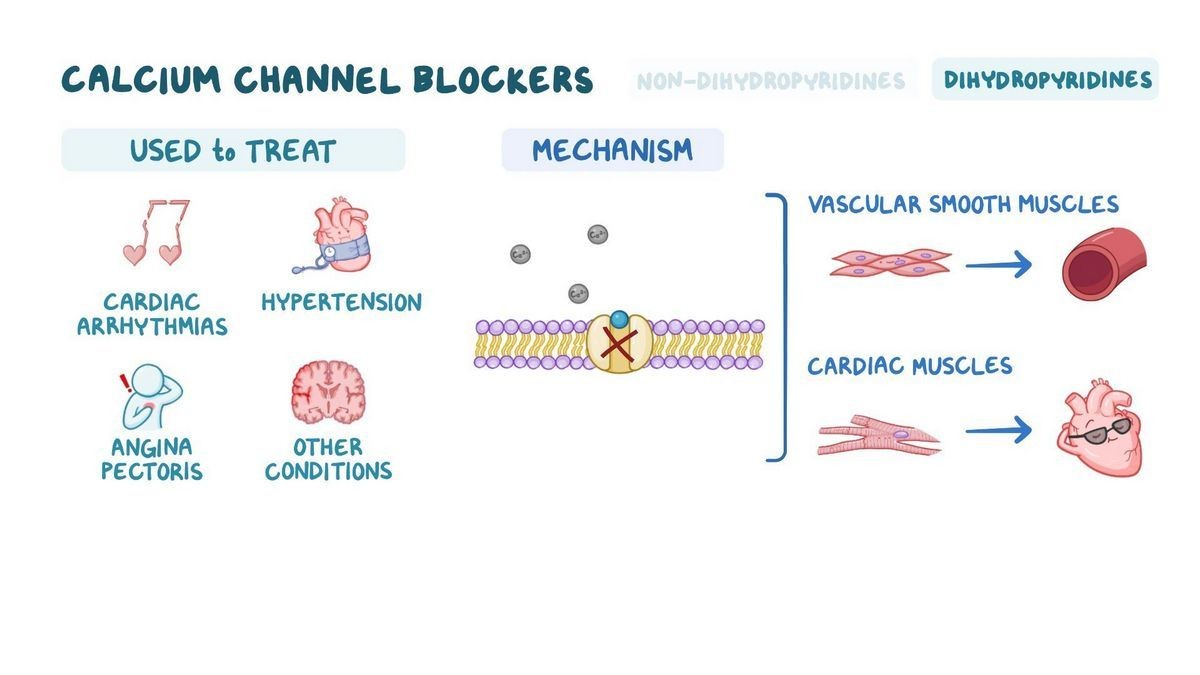
Contents
- 1 Calcium Channel Blockers vs. ACE Inhibitors
- 1.0.1 Side Effects of Calcium Channel Blockers and ACE Inhibitors
- 1.0.2 Dosage for Calcium Channel Blockers vs. ACE Inhibitors
- 1.0.3 Drug Interactions with Calcium Channel Blockers and ACE Inhibitors
- 1.0.4 Safety of Calcium Channel Blockers and ACE Inhibitors during Pregnancy or Breastfeeding
- 1.0.5 Summary
Calcium Channel Blockers vs. ACE Inhibitors
Calcium channel blockers (CCBs) dilate arteries, reducing pressure and making it easier for the heart to pump blood, reducing the heart’s need for oxygen and relieving or preventing angina. CCBs also treat high blood pressure and certain types of abnormal heart rhythms. They can be used after a heart attack, for patients who can’t tolerate beta-blocking drugs, have atrial fibrillation, or need treatment for angina. CCBs also treat migraines.
Angiotensin converting enzyme inhibitors (ACE inhibitors) inhibit the enzyme ACE, reducing the production of angiotensin II. This causes blood vessels to enlarge or dilate, lowering blood pressure. ACE inhibitors make it easier for the heart to pump blood, improving the function of a failing heart. They slow the progression of kidney disease due to high blood pressure or diabetes. ACE inhibitors are used to treat high blood pressure, left ventricular dysfunction, heart failure, prevent strokes, and prevent and treat kidney disease in people with hypertension or diabetes.
Side Effects of Calcium Channel Blockers and ACE Inhibitors
Calcium channel blockers
Common side effects of calcium channel blockers include:
- Constipation
- Nausea
- Headache
- Rash
- Edema (swelling of legs and feet with fluid)
- Low blood pressure
- Drowsiness
- Dizziness
Liver dysfunction and overgrowth of gums may also occur. Diltiazem (Cardizem) and verapamil (Calan, Isoptin) may worsen heart failure symptoms.
Like other blood pressure medications, calcium channel blockers can cause sexual dysfunction.
ACE Inhibitors
ACE inhibitors are generally well-tolerated, but not free of side effects.
They may cause birth defects and should not be prescribed to pregnant women. Individuals with bilateral renal artery stenosis or severe reactions to ACE inhibitors should avoid them.
Common side effects of ACE inhibitors include:
- Cough
- Elevated blood potassium levels
- Low blood pressure
- Dizziness
- Headache
- Drowsiness
- Weakness
- Abnormal taste
- Rash
- Chest pain
- Increased uric acid levels
- Sun sensitivity
- Increased BUN and creatinine levels
Coughing can take up to a month to subside, and if one ACE inhibitor causes coughing, others are likely to as well. Serious but rare side effects include kidney failure, allergic reactions, pancreatitis, liver dysfunction, a decrease in white blood cells, and tissue swelling.
Dosage for Calcium Channel Blockers vs. ACE Inhibitors
Calcium channel blockers
A common CCB, amlodipine, comes in oral tablet form. The recommended starting dose for children and adults is 2.5 to 5 mg once daily. The maximum dose for adults is 10 mg once daily and for children is 5 mg once daily. Amlodipine can be taken with or without food and may need dosage adjustments for patients with liver dysfunction.
ACE Inhibitors
ACE inhibitors are supplied as oral tablets. The usual starting dose of benazepril is 10 mg daily, or 5 mg daily with a diuretic. Doses may be increased to 20-40 mg once daily or divided and administered twice daily.
Drug Interactions with Calcium Channel Blockers and ACE Inhibitors
Calcium channel blockers
Verapamil or diltiazem can interact with other drugs, reducing their elimination by the liver. This can lead to toxicity from carbamazepine, simvastatin, atorvastatin, and lovastatin. Grapefruit juice can also elevate blood concentrations of certain calcium channel blockers.
ACE Inhibitors
ACE inhibitors have few interactions with other drugs, but they can increase blood levels of potassium and lithium. Aspirin and NSAIDs may reduce the blood pressure-lowering effects of ACE inhibitors. Combined use of diuretics and ACE inhibitors can cause excessive blood pressure reduction. ACE inhibitors should not be combined with ARBs, aliskiren, or injectable gold sodium aurothiomalate.
Safety of Calcium Channel Blockers and ACE Inhibitors during Pregnancy or Breastfeeding
Calcium channel blockers
Women who are pregnant or nursing should consult their doctors before using this class of drugs.
ACE Inhibitors
ACE inhibitors should not be prescribed to pregnant women due to the risk of birth defects. Nursing women should consult their doctors before using ACE inhibitors.
By clicking "Submit," I agree to the MedicineNet Terms and Conditions and Privacy Policy. I also agree to receive emails from MedicineNet and I understand that I may opt out of MedicineNet subscriptions at any time.
Summary
Calcium channel blockers (CCBs) and angiotensin-converting enzyme (ACE) inhibitors are used to treat high blood pressure. CCBs also relieve or prevent angina, treat certain abnormal heart rhythms, and migraines. ACE inhibitors also treat left ventricular dysfunction and heart failure, prevent strokes, and prevent and treat kidney disease in people with hypertension or diabetes.


